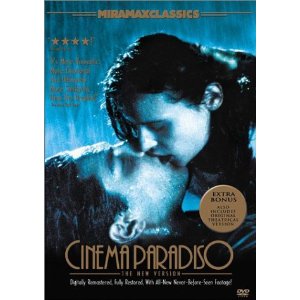 One of the most common debates I often get dragged into as a film buff is the difference between a romantic film & a chick-flick. Operating off my own set of standards for film, I would define a "chick-flick" as a light and ultimately shallow film that utilizes tired cliches and fails to surprise or challenge its audience. A chick-flick, by all means, is a marketing ploy by today's Hollywood; a ploy to lure in single mothers and teenage girls that desperately need their fix of 180 minutes of whimsical but all together trashy romantic romps. These films lack substance and class. Don't get me wrong, some chick -flicks are enjoyable, especially when they're self-aware in nature and half satirical. Pretty Woman & Serendipity come to mind; after all, sometimes we need a popcorn movie that is palatable & does not demand our every braincell to understand.
One of the most common debates I often get dragged into as a film buff is the difference between a romantic film & a chick-flick. Operating off my own set of standards for film, I would define a "chick-flick" as a light and ultimately shallow film that utilizes tired cliches and fails to surprise or challenge its audience. A chick-flick, by all means, is a marketing ploy by today's Hollywood; a ploy to lure in single mothers and teenage girls that desperately need their fix of 180 minutes of whimsical but all together trashy romantic romps. These films lack substance and class. Don't get me wrong, some chick -flicks are enjoyable, especially when they're self-aware in nature and half satirical. Pretty Woman & Serendipity come to mind; after all, sometimes we need a popcorn movie that is palatable & does not demand our every braincell to understand. Cinema Paradiso is a 1988 Italian film directed by Giuseppe Tornatore and is easily one of the most romantic films I have ever seen. I felt it necessary to differentiate between a chick-flick & romantic film at the beginning of this post, because I would never classify Tornatore's film as a chick-flick. Cinema Paradiso is romance done right. The film's approach seems founded in the belief that romance is not defined by a cliched love story; but rather by a certain approach to life...an eager desire to live life to the fullest. To examine true romance is to feel the greatest highs and suffer the worst lows. A well made romantic film propels its audience through a spectrum of emotion but ultimately does what all great art must, provide unflinching truth, because in real life the boy does not always get the girl.
Cinema Paradiso tells the story of Salvatore "Toto" Di Vita, a young boy who lives in a small town in Italy. The film examines Toto's undying love for cinema; even from an early age Toto demonstrates a passion for cinema, constantly harassing his local theater's projectionist, Alfredo. Toto soon wins over Alfredo's heart and the two become inseparable. Alfredo is wise and scarred by life and takes Toto in as his own, teaching him the art of film projection and occasionally instructing him on life's more serious matters. Toto, an orphan after losing his father to WWII, is receptive and Alfredo quickly becomes a father figure for him. Much of the magic from this film is derived from watching the onscreen chemistry between Alfredo & Toto. Their relationship is sweet and pure but not devoid of flaw and is fascinating to watch. While the saga could certainly be categorized as a romance film, it could just as easily be considered a character study. Every major character in the film has layers & depth and most importantly are human in nature; they make mistakes, have regrets, and do not always find the happy ending. Many have described this film as a love letter of sorts to cinema and the magic of the movies. The director's cut of this film however, features an additional fifty minutes of footage cut from the theatrical version that focus more on Toto's love story with a young girl in his village named Elena.
The film is shot beautifully and the score by Ennio Morricone is nothing short of marvelous. Powerful scenes coupled with great acting and a haunting score will surely cause some spine tingling. Films that can actually effect a psychosomatic reaction are few and far between and this is one of them. Tornatore's subject matter in this film is tribute to old cinema but his styling and the overall feel of the film is nothing less. Men courting women from underneath their balconies and kisses in the rain are a plenty, but rather than falling into cliche, Tornatore excels at maintaining good taste and within the context of the film, everything presented feels legitimate. Easily one of the best films I have ever seen, Cinema Paradiso is a movie for romantics and anyone who loves the cinema.


The notebook is a chick flick, you're just going to have to admit you're wrong.
ReplyDelete